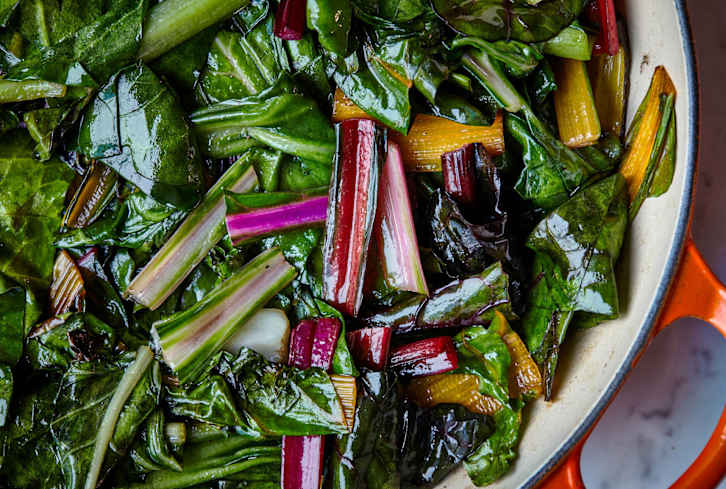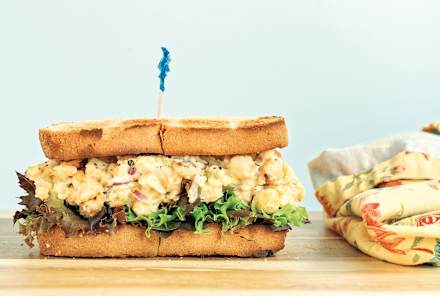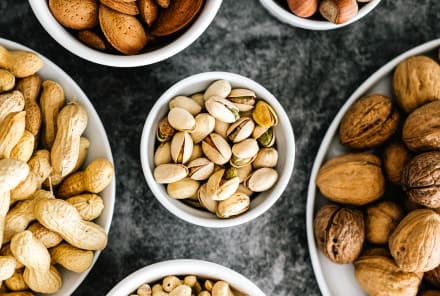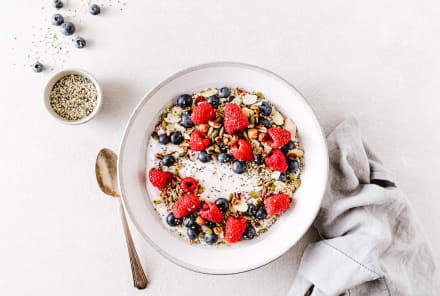Advertisement
A Guide To Intuitive Eating: Benefits, Practice & Principles


Have you heard of intuitive eating? It's a food philosophy that puts you in charge of what to eat and when to eat it. It's based on the idea that your body knows when it's hungry or full, and that you are the only person who should be making eating decisions for yourself.
Intuitive eating goes a step beyond mindful eating, which is about being present in the actual eating experience. Rather than just suggesting a nonjudgmental presence while you eat, intuitive eating encourages you to change your relationship with food by listening to—and honoring—what your body wants to eat.
What exactly is intuitive eating?
While research on the concepts of intuitive eating goes back to the 1970s, the term was officially coined in 1995 by two registered dietitians, Evelyn Tribole, M.S., RDN, and Elyse Resch, M.S., RDN, in their book Intuitive Eating: A Revolutionary Anti-Diet Approach.
A simple definition of intuitive eating is respecting your health and meeting your physical and physiological needs by listening to and honoring your body's messages about what to eat. In other words, you base your eating decisions on what your body wants. You eat when you're hungry and you stop when you're full.
Intuitive eating is not a diet plan. In fact, it's often deemed an "anti-diet." Because of that, there's no right or wrong way to do it. Jessica Sepel, a nutritionist and instructor for the mbg class How To Stop Dieting & Learn To Eat Intuitively, previously told mbg that the foundation of intuitive eating is giving yourself permission to enjoy and love food.
"Remind yourself that you are worthy of enjoying and loving yourself. You have to let go of a desire to deprive yourself," she says. "If you love yourself enough—you will let go. When you rebuild that foundation of self-love, you realize you don't deserve to put yourself through deprivation and restriction; your body is too precious for that."
What are the benefits?
While many people are initially drawn to various diets for their promise of shedding pounds, the benefits of intuitive eating go beyond weight loss. In one review published in the Journal of the Academy of Nutrition and Dietetics, researchers compiled the data from several studies on intuitive eating and found various physical and mental benefits, including:
- Decreased dietary restraint and binge-eating behaviors
- Healthier relationships with food
- Improvements in blood pressure and cholesterol levels, even without weight loss
- Decreased depression and anxiety
- Increased self-esteem
- Improved body image
But even though intuitive eating isn't meant to be a weight loss plan, studies show that intuitive eating can lead to significant weight loss1, lower BMI2, long-term weight maintenance3, and lasting behavior changes.
Researchers from one study specifically focused on postpartum weight loss found that new mothers following an intuitive eating approach may have an easier time losing weight4 without the need to measure or record food intake.
How do you practice intuitive eating?
The concept of intuitive eating is simple: You eat when you're hungry, and you stop when you're full. But even though it doesn't seem complicated, it does take some practice. After years of dieting or having an unhealthy relationship with food, it may take some time to cut through the noise and truly get in touch with what your body needs.
The first step of intuitive eating is learning the difference between physical and emotional hunger. Physical hunger, which presents as lack of energy, increased irritability, and hunger pangs, is a physiological need to eat. Emotional hunger, which is driven by uncomfortable emotions like sadness or boredom, is the desire to eat to satisfy cravings, even if you're not physically hungry.
Once you've learned to differentiate between physical and emotional hunger, the next step is to pay attention to when they show up. Next time you feel hungry, ask yourself if you're experiencing physical or emotional hunger. If the hunger is physical, eat until you're comfortably full, but not overstuffed.
Christy Harrison, MPH, R.D., CDN, an anti-diet registered dietitian nutritionist and certified intuitive eating counselor, says, "The solution to wonky or absent hunger cues is showing your body that it won't be deprived anymore; that means eating consistent meals and snacks, even if you don't feel hungry. Slowly, you'll start to rebuild that trust with your body," she says. "And eventually, you'll get back to being able to recognize and honor your hunger the way you were born doing."
Sepel also points out that it's important to let go of negative self-talk. "No more 'I'm eating too much' or 'I have no willpower,'" she says. "When you become a whole food eater and give up dieting, there should be no such thing as good or bad food. You're just committing to eating well 80 to 90% of the time, then relaxing with the rest. Your body can handle imperfect eating with moderation, but you need to trust your body first."
What are the 10 principles of intuitive eating?
There are no strict rules of intuitive eating, but there are 10 principles that are designed to increase body awareness, remove obstacles to accepting yourself, and help you become aware of internal body sensations—a process called interoceptive awareness:
Reject the "diet" mentality.
Get rid of the notion that there's one magic diet out there that will work for you. Instead of hopping from diet to diet looking for a quick fix, commit to listening to your body.
Honor your hunger.
Don't think of hunger as a bad thing or something that you must overcome. Learn what your physical hunger cues are, and eat when you feel hungry.
Make peace with food.
Don't assign foods a moral value of "good" or "bad." Give yourself permission to eat what you want while paying attention to what your body really needs rather than what it craves.
Challenge the food police.
Don't make negative comments about specific foods, or about yourself for eating them, and ask that others around you do the same. You're not "bad" for eating a certain type of food.
Respect your fullness.
Stop eating when you're comfortably full, instead of clearing your plate or eating more than you need because something tastes good. Check in with yourself during your meal, eat slowly, and pause to assess your current hunger or fullness levels.
Discover the satisfaction factor.
There's a difference between physical fullness and satisfaction. When you deprive yourself of what you really want, you may feel physically full, but you won't feel satisfied. Make eating enjoyable and pleasurable by preparing a meal that tastes good to you and sit down and immerse yourself in the experience of eating it.
Honor your feelings without food.
People often use food to try to quell uncomfortable emotions, like boredom, stress, or sadness. Instead of using food to try to make you happy, find other ways to work through your emotions, like exercise, journaling, or meditation.
Respect your body.
Stop criticizing your body and learn to love and accept yourself as you are, right now. It's OK if weight loss is one of your goals, but respect your body without stipulations during the process.
Exercise and feel the difference.
Instead of viewing exercise as a way to burn calories or prompt weight loss, try to view it as a way to honor your body's need for regular movement. Find an exercise that you enjoy doing, and shift your focus from weight loss to its other benefits, like increased energy and improved mood.
Honor your health with gentle nutrition.
Even though intuitive eating doesn't impart strict rules around food, it's still best to choose wholesome, nutrient-dense foods most of the time. You can treat yourself when you truly want to, but ideally, your food choices will honor your health as much as you honor your body's desires.
Bottom line.
Intuitive eating is an anti-diet approach to eating that involves listening to and honoring your internal hunger and fullness cues. The idea is that when you learn how to properly interpret your body's needs, it can lead to a better relationship with food, a decrease in binge-eating behaviors, and long-term weight maintenance. If you're used to restrictive dieting, it may take some time to get in touch with your body's needs, but following the 10 intuitive eating principles can help you get there.
Watch Next
Enjoy some of our favorite clips from classes
Enjoy some of our favorite clips from classes
What Is Meditation?
Mindfulness/Spirituality | Light Watkins
Box Breathing
Mindfulness/Spirituality | Gwen Dittmar
What Breathwork Can Address
Mindfulness/Spirituality | Gwen Dittmar
The 8 Limbs of Yoga - What is Asana?
Yoga | Caley Alyssa
Two Standing Postures to Open Up Tight Hips
Yoga | Caley Alyssa
How Plants Can Optimize Athletic Performance
Nutrition | Rich Roll
What to Eat Before a Workout
Nutrition | Rich Roll
How Ayurveda Helps Us Navigate Modern Life
Nutrition | Sahara Rose
Messages About Love & Relationships
Love & Relationships | Esther Perel
Love Languages
Love & Relationships | Esther Perel
What Is Meditation?
Box Breathing
What Breathwork Can Address
The 8 Limbs of Yoga - What is Asana?
Two Standing Postures to Open Up Tight Hips
How Plants Can Optimize Athletic Performance
What to Eat Before a Workout
How Ayurveda Helps Us Navigate Modern Life
Messages About Love & Relationships
Love Languages
Advertisement

Toasted vs. Untoasted Bread: Experts Explain If One's Easier To Digest
Ximena Araya-Fischel, M.A

Toasted vs. Untoasted Bread: Experts Explain If One's Easier To Digest
Ximena Araya-Fischel, M.A

Toasted vs. Untoasted Bread: Experts Explain If One's Easier To Digest
Ximena Araya-Fischel, M.A

This RD's Tip Helps Gauge The Nutrient Density Of Meals (+ A Tasty Recipe)
Carly Knowles, M.S., RDN, L.D.

Toasted vs. Untoasted Bread: Experts Explain If One's Easier To Digest
Ximena Araya-Fischel, M.A

This RD's Tip Helps Gauge The Nutrient Density Of Meals (+ A Tasty Recipe)
Carly Knowles, M.S., RDN, L.D.















